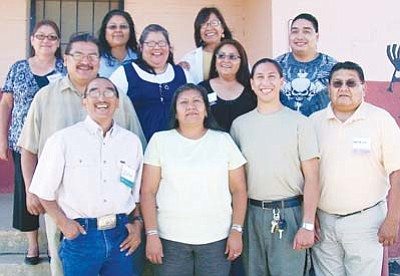Nikishna Polequaptewa, director of the American Indian Resource Program at UC Irvine, has been selected as the first fellow for the UC Leadership Fellows Program.The fellowship’s goal is to help nurture talented Native American staff members within the UC system for senior-level administration positions, which will help the University of California diversify its leadership to reflect the students and communities it serves, said Joseph Castro, vice chancellor for student academic affairs at UC San Francisco, who is helping to develop the program and is serving as a mentor.
“It’s clear that we haven’t yet achieved that goal,” Castro said. “One area of focus that’s needed is to make sure that Native communities are represented at the highest levels of the university.”
Native Americans are one of the most underrepresented groups among UC staff members. The idea for a fellowship to prepare candidates for top positions was sparked after Castro spoke on a panel in 2010 about leadership at the Native American Professional Development Conference, a statewide event co-sponsored by the UC American Indian Counselors and Recruiters Association and the UC Council of Vice Chancellors of Student Affairs.
One of the things Castro suggested for developing future leaders was mentoring from senior executives, which led to an effort to create a formal mentorship program for Native American staff members at UC.
“That’s why I was interested in designing this program,” Castro said. “(The fellowship) is creating an opportunity for people like Nikishna, talented professionals, to get a broad sense of the university and prepare for leadership positions at an even higher level.”
Polequaptewa was initially reluctant to accept the offer to serve as the inaugural fellow, saying he wanted to help build the opportunity for someone else. But the group organizing the fellowship persuaded him to do it because his exemplary experience, and his background as the NAPDC 2011 Native American Professional of the Year and as chair of the systemwide UC American Indian Counselors & Recruiters Association, could be beneficial in designing the fellowship for future years.
“I’m not just trying to better myself, but to find out how best to operate within the institutional framework to create improve services that actually matter to people and make a difference in their lives,” Polequaptewa said.
Polequaptewa is a 2005 UC Irvine graduate and the founding director of the campus’ American Indian Resource Program, established in 2007 to provide support for students and encourage more Native Americans to attend college. It does outreach to high schools and runs a summer science camp to give students a taste of college.
As a UC Irvine student, Polequaptewa was president of the campus American Indian Student Association, which was active in mentoring Native students. He is an enrolled member of the Hopi Tribe of northeastern Arizona and is of the Badger and Spider clans.
For his fellowship, Polequaptewa started monthly visits to UCSF in January to spend a few days working with Castro, who is serving as a fellowship mentor this year. Some of the skills a good leader needs are the ability to work effectively with a wide range of people, to have an open mind to innovations and have an excellent understanding of the financial aspects of leading and managing university programs, Castro said.
“There are few who possess the unique personal experience and the professional background and skills that he brings,” Castro said of Polequaptewa. “That’s a huge asset for UCSF and the UC system and a great benefit of this program. While he’s learning some new things, we’re learning from him. This makes it a mutual beneficial experience.”
So far, Polequaptewa said he’s been getting familiar with different aspects of UCSF and learning about the nuances of administration in the UC system, the importance of having a vision and value of approaching things from a team perspective.
“It’s kind of like being a conductor in an orchestra,” Polequaptewa said. “You don’t have to play every instrument for them, but you have to get the musicians in sync for a concert to be performed.”
To provide more practical experience, the plan is for the fellow to work on a project for a year. Polequaptewa will assist UCSF in developing its new multicultural resource center.
“It’s more real-life experiences,” Polequaptewa said. “This is what really happens, the how, when, why and the complexity … I get to ask a lot of questions about the circumstances surrounding senior management decision-making processes.”
The fellowship has the support of the UC Council of Vice Chancellors of Student Affairs, which Castro chairs. If everything works well in this pilot year, the plan for 2013 and beyond is to have a formal application process and have the fellowship move to a different campus each year.
“We’re trying to create a pool of qualified individuals who bring a unique perspective to problem solving,” Polequaptewa said “The goal is to have people ready to be considered for these management positions.”
– By Harry Mok, UC Office of the President, Wednesday, April 4, 2012 Harry Mok is a principal editor in the UC Office of the President’s Integrated Communications group. For more news, visit the UC Newsroom or follow us on Twitter.
Link to Original Article
